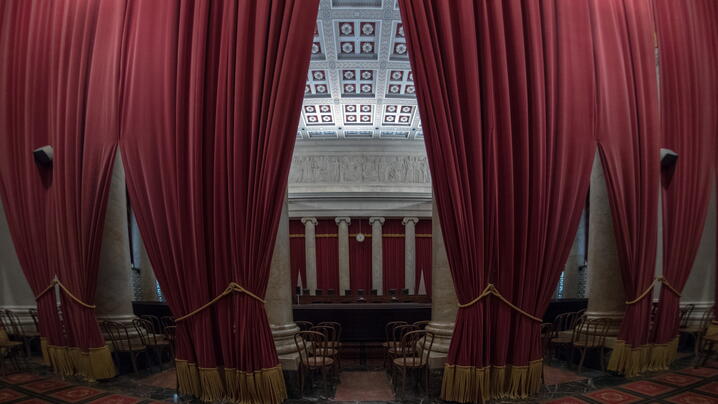
by Lisa Soronen and Tillman Breckenridge, State and Local Legal Center
In South Dakota v. Wayfair, South Dakota is asking the Supreme Court to rule that states and local governments may require retailers with no in-state physical presence to collect sales tax. Doing so will require the Court to overrule Quill v. North Dakota (1992), where it held that states and local governments could not require a business to collect sales tax unless the business has a physical presence in the state.
Based on oral argument the Court is likely to follow one of three paths. It could keep the physical presence test and not overturn Quill. It could overturn Quill and replace (or add to) the physical presence test an economic nexus test (like the South Dakota law which requires out-of-state vendors to collect tax only if they annually conduct $100,000 worth of business or 200 separate transactions annually in the state). Finally, it could overturn Quill and allow states to require all out-of-state vendors to collect sales tax no matter how much (or little) business they do in a state.
Before oral argument, South Dakota likely counted three votes in favor of overturning Quill. In 2015 Justice Kennedy wrote a concurring opinion stating that the “legal system should find an appropriate case for this Court to reexamine Quill.” While on the Tenth Circuit then-judge Gorsuch wrote an opinion strongly implying that given the opportunity the Supreme Court should overrule Quill. Finally, while Justice Thomas voted against North Dakota in Quill, he has since rejected the concept of a dormant Commerce Clause, on which the Quill decisions rests.
It was less clear before oral argument whether these three Justices would favor replacing the physical presence test with an economic nexus test or replacing it with nothing at all. At oral argument, both Justices Kennedy and Gorsuch asked questions indicating they were interested in getting rid of Quill altogether and not replacing it with a new test. Justice Ginsburg’s numerous questions indicated she was thinking the same thing. As usual, Justice Thomas was silent.
Justice Sotomayor’s questions indicated she was firmly against overturning Quill for numerous reasons. Justice Kagan asked only a few questions—but indicated twice that Congress and not the Court should fix Quill.
Justice Breyer emphatically indicated he wasn’t sure how he was going to vote.
Questions from Chief Justice Roberts and Justice Alito on balance seemed to indicate they were skeptical about overturning Quill. But both seemed open to the possibility of an economic nexus test. Roberts asked South Dakota’s lawyer “did I understand you to acknowledge that there would be a constitutional minimum with respect to the burdens? In other words, that . . . you could not impose the obligation on some small businesses?”
The following question from Justice Alito may seem hostile to overturning Quill unless you consider the answer to it is the Court may adopt an economic nexus test like South Dakota’s: “But do you have any doubt that states that are tottering on the edge of insolvency and municipalities which may be in even worse position have a strong incentive to grab everything they possibly can?”
While predicting what the Court might do based on oral argument is tricky business, it is not too difficult to count four votes for overturning Quill (Kennedy, Thomas, Ginsburg, and Gorsuch). Getting a fifth vote from Chief Justice Roberts or Justices Breyer, Alito, or Kagan as to an economic nexus test seems possible. Five votes to repudiate Quill with no replacement seems unlikely. But most states and local governments would be fine with an economic nexus test.
Related Content
Supreme Court Hears Oral Argument in Internet Sales Tax Case. This 2018 blog post, review the questions and answers during the Wayfair case oral argument.
Supreme Court to Decide Billon Dollar Sales Tax Case. A 2018 PM Article that goes in-depth into the history of both the Wayfair case and out of state sales tax.
SLLC Files Supreme Court Amicus Brief in Internet Sales Tax Case. Another 2018 blog post focuses on the Amicus brief SLLC filed on behalf of ICMA and other local government organizations.
New, Reduced Membership Dues
A new, reduced dues rate is available for CAOs/ACAOs, along with additional discounts for those in smaller communities, has been implemented. Learn more and be sure to join or renew today!
